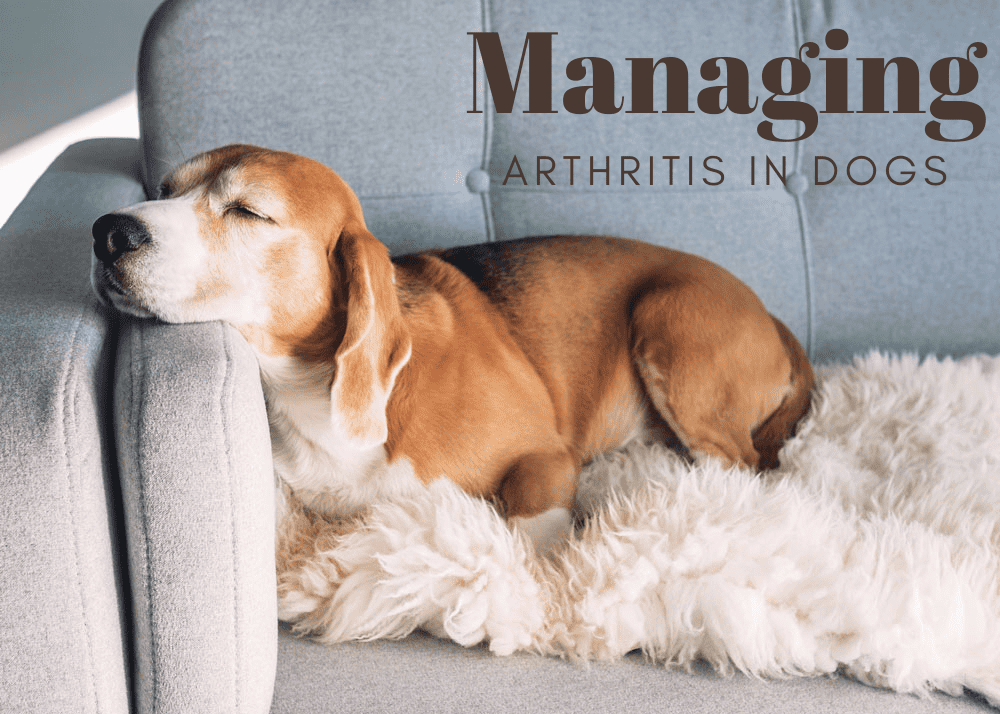Arthritis is a common ailment affecting our pets today, especially middle-aged to senior dogs and cats. It causes pets to get stiff at rest and have difficulty running, walking and jumping. Don’t rely on crying to determine if your pet is in pain. Crying is a sign of severe pain. Disability is a more sensitive indicator of pain.
Like in people, one of the main contributors to arthritis in dogs and cats is excess weight putting stress on joints – and there is a lot of extra weight to go around. Being overweight and obese set the stage for increased risk of joint damage and subsequent osteoarthritis (OA), leading to chronic pain. At least 20% of all dogs, regardless of age, show evidence of OA. The risk of OA goes up with age as well as with increasing bone structure size, so the older and bigger the dog, the more likely it is to suffer from the inflammation and pain of OA. Unfortunately, dogs that are overweight or obese traumatize their joints over a very long period before we can see clinical evidence of the damage. It takes years of joint damage for changes from OA to show up on an X-ray.
Is there more to this linkage between obesity/being overweight and pain?
Until recently, veterinarians thought that the increased pain and inflammation associated with OA in overweight and obese dogs was primarily due to the increased wear and tear on the joints. What we now know is that fat tissue is biologically active and secretes hormones and other chemicals that both cause and enhance inflammation.
A hormone called leptin is produced by fat cells and causes inflammation when it infiltrates joints. In addition, leptin may influence the bone changes associated with OA. Finally, inflammation can affect the body’s responses to other hormones such as cortisol and insulin, further unbalancing the body’s attempts at self-regulation and influencing the amount and extent of pain dogs experience. The important underlying message is that fat itself contributes to inflammation, inflammation is a part of the pain associated with OA and degenerative joint disease, and being overweight or obese contributes to this vicious cycle.
If your veterinarian has indicated that your pet is overweight, it is important to take those concerns seriously. Lean dogs have less arthritis problems and actually live longer! You can help your pet lose weight by gradually reducing daily caloric intake, particularly from treats, and ensuring your pet engages in regular, low-impact exercise.
What can be done besides management of body weight?
- Manage activity– Moderate amounts of low-impact activity, such as walking, is helpful. However you should avoid or limit high-impact activity (running, jumping).For dogs that are overweight and are noticeably uncomfortable or limping on walks, you might consider swimming activities to reduce the pressure on joints during exercise.
- Joint supplements– there are numerous joint supplements available, and also a huge difference in quality since supplements are not FDA regulated. Ask your veterinarian for a recommendation on a joint supplement.
- Anti-inflammatory drugs– remember that inflammation that we talked about? There are prescription medications that can reduce the amount of inflammation in the joints, which in turn relieves the pain that your dog is experiencing and makes them more comfortable.
- Physical Rehabilitation is a way to decrease pain and improve mobility through the use of massage, stretching, and therapeutic exercise. Dr. Ellie is a Certified Canine Rehabilitation Therapist and can work together with you to create an individual therapy plan tailored to your dog’s needs.
- Environmental Modification and walking aids– consider:
- Carpet runners, yoga mats
- Ramps and steps
- Raised food and water bowls
- Pawz booties or PawFriction for better traction
- Slings such as a Gingerlead or Help’Em Up harness
- Surgery- for some conditions, such as hip dysplasia, total joint replacements or other surgical salvage procedures may be considered.
Arthritis is not a condition that can be cured, but with weight control and other measures, we can keep your pet comfortable for a long time. If your pet is showing signs of arthritis, schedule an appointment so we can come up with the best recommendations to keep them comfortable.
